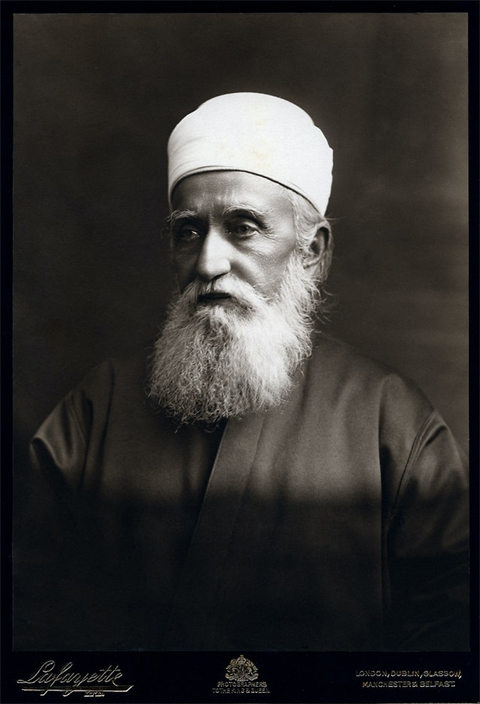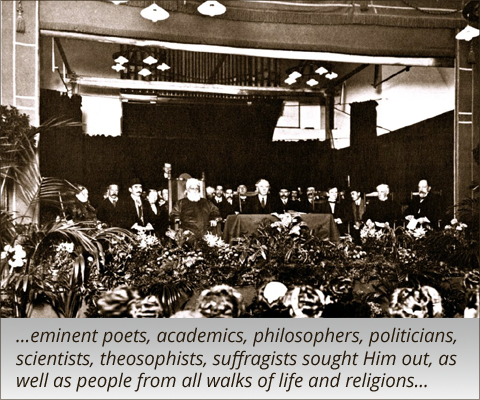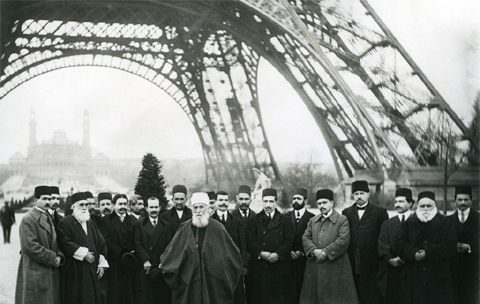|

Episode 6
September
7, 2021
The Harbinger of World Peace
His figure was of such perfect symmetry, and so full of
dignity and grace, that the first impression was that of considerable
height. He seemed an incarnation of loving understanding, of compassion
and power, of wisdom and authority, of strength, and of a buoyant
youthfulness, which somehow defied the burden of His years; and such
years!
– Lady Blomfield

In 1892, with the aid of its first Bahá’í teachers, the Bahá’í Faith
arrived on North American soil, and in February 1898, the first group
of 15 American pilgrims – headed and funded by Phoebe Hearst, the
mother of newspaper tycoon William Randolph Hearst – arrived in Haifa.
Although ‘Abdu’l-Bahá was still a prisoner living under constant
scrutiny from the government, the pilgrims were allowed to meet with
the Master, if only briefly. All were transformed by their encounter
with ‘Abdu’l-Bahá, and May Ellis Bolles, who later married the great
Canadian architect William Sutherland Maxwell, beautifully expressed
her transformation during their first meeting with ‘Abdu’l-Bahá: "Of
that first meeting I can remember neither joy nor pain nor anything
that I can name. I had been carried suddenly to too great a height; my
soul had come in contact with the Divine Spirit; and this force so
pure, so holy, so mighty had overwhelmed me... And when He arose and
suddenly left us, we came back with a start to life: but never again,
oh! never again, thank God, to the same life on this earth.”
These pilgrims returned home on fire for the Bahá’i Faith and across
the years, its teachings on the oneness of humanity, religion and God
gradually spread across North America and Europe, and the number of
pilgrims visiting the Master also increased or decreased depending on
the level of danger darkening ‘Abdu’l-Bahá’s life. After recuperating
His health in Egypt in 1910, ‘Abdu’l-Bahá set sail for Marseilles in
France in August 1911, then traveled to Thonon-les-Bains and Geneva in
Switzerland and then on to England. With a twinkle in His eye, the
Master addressed the enthralled Bahá’is who had gathered in London,
stating: “I am very much pleased with you all. Your love has drawn Me
to London. I waited forty years in prison to bring the Message to you.
Are you pleased to receive such a guest?

”The print media of the time, fascinated with the former prisoner
meticulously dressed in Eastern clothing and surrounded by a cohort of
Persians, was on high alert wherever the Master traveled within London
and surrounding towns, which included Bristol, Woking and Reading. As
He had done in Egypt, His door at Cadogan Gardens was open to all –
eminent poets, academics, philosophers, politicians, scientists,
theosophists, suffragists sought Him out, as well as people from all
walks of life and religions such as Christians, Muslims, Buddhists,
Zoroastrians and Hindus – but His greatest joy was meeting the poor and
alleviating their condition with great generosity, both financially and
spiritually. Any funds that were offered to ‘Abdu’l-Bahá were
graciously accepted and just as graciously given back with the
instruction that they be used for the benefit of the poor.
When asked about His decades of imprisonment, the Master said: “Freedom
is not a matter of place but of condition. I was happy in that prison,
for
those days were passed in the path of service. To me, prison was
freedom. Troubles are a rest to me. Death is life. To be despised is
honour. Therefore, I was full of happiness all through that prison
time. When one is released from the prison of self, that is indeed
freedom! For self is the greatest prison. When this release takes
place, one can never be imprisoned.”
On September 10, 1911, Reverend Reginald J. Campbell invited
‘Abdu’l-Bahá to give His first ever public address before an audience
of 2,000 at City Temple in London. The Master spoke in Persian with the
help of a translator, and transfixing those who had gathered, this is
some of what He said: “O noble friends, seekers after God!
Praise be to God! […] The sea of the unity of mankind is lifting up its
waves with joy, for there is real communication between the hearts and
minds of men […] In the days of old an instinct for warfare was
developed in the struggle with wild animals; this is no longer
necessary. Nay, rather, cooperation and mutual understanding are seen
to produce the greatest welfare of mankind. Enmity is now the result of
prejudice only. […] There is one God, mankind is one, the foundations
of religion are one. Let us worship Him and give praise for all. The
blessing of the Eternal One be with you in all its richness, that each
soul according to his measure may take freely of Him. Amen."
After many subsequent talks and exhaustive visits to and from hundreds
of people, ‘Abdu’l-Bahá arrived in Paris on October 3, 1911, where He
stayed for nine weeks, graciously enduring yet another punishing
schedule before returning to Egypt, where He rested and prepared for
His monumental journey to the United States and Canada.

|
|
